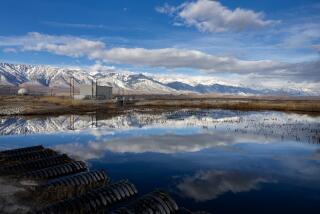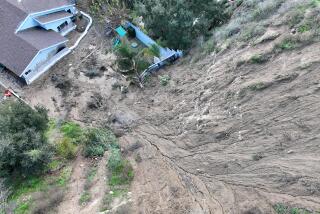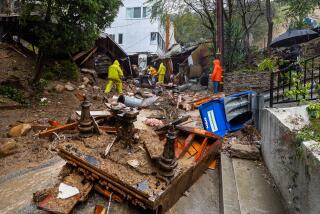A Dampening Effect
- Share via
El Nino’s deluge is testing the fortitude and creativity of many Southern California businesses, as they grapple with delays, slower sales, and last-minute changes.
Home-building projects have been stalled, some restaurants have had fewer patrons, and farmers are coping with flooded fields. In fact, almost any type of business that relies on the region’s vaunted sunshine is feeling some pain from the rain.
Despite the difficulties, the overall economic impact from the storms--so far, at least--is likely to be small, experts say.
Ted Gibson, chief economist at the state Department of Finance, expects that retail sales will be down 1% to 2% during the first quarter. But that will likely be offset by increased sales of repair items in the second quarter, he said.
“I think it’s going to rearrange spending a little bit,” he said. “But I don’t know if, when all is said and done, we’ll see any long-term economic damage.”
Before the last set of storms, the state estimated that El Nino had cost $65 million in crop losses. But such figures can be misleading, Gibson said, because the remaining crops might sell for higher prices.
Nationally, El Nino rates “only a footnote in economic history so far,” said Mark Zandi, chief economist at Regional Financial Associates in West Chester, Pa. And while California has fared worse than most other regions, said Zandi, who tracks the state economy, he still sees little lasting impact.
Total damage estimates for El Nino, at $500 million to $600 million currently, are just a drop in the bucket compared with the 1994 Northridge earthquake, which is estimated to have cost $30 billion. There’s even evidence that this El Nino has been less disruptive to businesses than previous ones because there has been less flooding in urban areas, Gibson said.
The biggest difference between the current El Nino and past natural disasters such as the Northridge quake and Florida’s Hurricane Andrew, economists say, is that business activity has only been delayed--not shut down. The region’s economy is now strong enough that any drop in sales will likely be offset later in the year, they say.
What’s more, experts say, it’s fortunate that the storms have come during the winter, which is traditionally the slow season for many industries. At Universal Studios, for example, “obviously attendance is diminished,” said spokesman Jim Yeager, but he added that it’s much less of a concern than it would be during peak vacation time.
Nonetheless, the storms are taking a toll on many local businesses.
*
In the construction trade, El Nino has put a damper on what is otherwise the best season the industry has seen in years. Economists predict that when the state releases employment figures for January and February, they’ll likely show a drop in construction-related jobs.
“Rain that comes every three or four days is a real pain for the building industry,” said Terry Neale, vice president of land acquisition at Laing Homes in Irvine.
The soggy weather makes it impossible to pour concrete, causing delays in every link in the building chain, he said.
“That hurts subcontractors, it hurts us, and it means there will be fewer houses on the market available for home buyers to close.”
Business at Triangle Rock Products in Silverado Canyon, which mines sand for concrete, has fallen from about 100,000 tons of sand usually sold by this time of year to just 35,000 tons, said dispatcher Sheldon Faust.
The big surprise, said Randall Lewis, executive vice president of Lewis Homes in Upland, is that eager house shoppers are still turning out in big numbers at some of the best-selling projects. His company sold 28 homes last week in Southern California--a pace it would have been pleased with in pleasant weather. Lewis thinks buyers are braving the rain because they see prices rising and don’t want to risk waiting.
*
But at Bicisport-Celo Europa bicycle shop in Laguna Hills, “There’s just no business,” said owner Marcel Calborn.
He complained that Californians “are spoiled, basically.” In New York, “there was a blizzard outside in January and a guy in a bike shop sold 10 bikes. I have a little cloud outside my shop and I can’t sell anything.”
And at the David L. Baker Memorial Golf Center in Fountain Valley, general manager Mike Shank said heavy rain has chased away some golfers. But many are hardy souls, he said, and even in Monday’s downpour some were out on the course. “They don’t care,” he said. “They’ll play rain, shine, or snow.”
At El Torito Restaurants, spokeswoman Gayle DeBrosse said that rainy-day sales have been off 10% to 15%, and on average the chain expects sales to be down 2% to 3% for the season.
Wolfgang Puck Food Co.’s sales are down about 10% at restaurants in open-air malls such as Universal CityWalk, said President Frank Guidara. “People react to rain here just like they do to snowstorms back East,” he said. “They stay home.” The good news, he said, is that they’re buying more of the company’s frozen foods.
Car dealers say the wet weather dried up traffic in their showrooms, and auto companies fear sales for February could be off slightly due to the storms. Sales at Isuzu of Santa Monica were down 5% to 10% and general manager Jeff LaPlant said sales at three other company dealerships were off as well.
*
Bertram McCann usually welcomes rain. As the owner of a small Marina del Rey company, Filmboats Inc., which provides boats and marine services to movie and television producers, he said it gives him the chance to “market and schmooze more.” But now that he’s had far more than the normal amount of downtime as productions delay or rearrange filming schedules, he’s ready for some clear skies.
McCann has managed to slip in a few commercial jobs, which involve one or two days of filming. But big projects such as “Lethal Weapon 4” have been postponed, he said, leaving him with far too much time on his hands. He’s trying to get a loan to tide him through.
“Hopefully, the people who financed my house will decide it’s gone up enough in the year since I bought it,” he said.
The recent downpours have played havoc throughout the motion picture business. “Everyone is scrambling for interior locations,” said Michael Bobenko, senior vice president of operations at the Entertainment Industry Development Corp.’s Los Angeles film office.
*
Meanwhile, the rains are challenging the resourcefulness of local companies involved with getting products from here to there.
Newsprint hauler Hobbs Trucking Co. in Anaheim, for example, prepared for El Nino by idling its fleet of open flat-bed trailers and arranging to have covered vans ready for shipments.
Conway Western Express, an Orange trucking firm, mapped out alternate routes for drivers faced with snow delays through the Grapevine and other areas, said manager Marty Menasco.
The new routes take longer, and the firm’s expenses have probably increased about 5%, he said. “Drivers have to slow down, but they still make it through,” he said. “People just have to understand we’re not going to be as quick as we used to be.”
Yet some businesses say they’ve seen little impact from the storms, and some have even benefited.
Theater owners have found that the Southland’s drenching hasn’t dampened attendance--largely because of another phenomenon, “Titanic,” which is breaking box office records and pushing overall industry receipts even higher than last year’s big numbers. “It’s escapism,” said Chan Wood, executive vice president of Pacific Theatres in Los Angeles.
Even bowling alleys are doing brisk business. Sales are up as much as 10% from a year ago at Lake Forest Lanes, said manager Jason Wagner. On rainy days, he said, bowlers have been waiting more than an hour for lanes.
Some businesses are preparing for an onslaught when the storms eventually subside. Ross Shaw, president of RC Landscape Construction Inc. in San Clemente, said he’s already booked for two to three months to fix drains, slopes, retaining walls and landscapes. He said he hasn’t been this busy since the 1980s.
Pest control firms have been swamped, as ants and rodents have moved into homes, and possums, squirrels, raccoons and even coyotes have torn shingles off roofs or ripped away mesh coverings on air vents and crawl holes. Stanley Pest Control in South El Monte has had a 30% jump in businesses this winter, said vice president Mark Puglisi.
And Saddleback Sand & Gravel in El Toro has sold about 500,000 sandbags since “sandbag season” began Sept. 15, more than twice the amount sold at the same time last year, said manager George Visser.
“We’ve been working from sunup to sundown trying to get these sandbags out,” he said.
*
Times staff writers John O’Dell and E. Scott Reckard, and correspondent Leslie Earnest contributed to this story.
More to Read
Inside the business of entertainment
The Wide Shot brings you news, analysis and insights on everything from streaming wars to production — and what it all means for the future.
You may occasionally receive promotional content from the Los Angeles Times.











